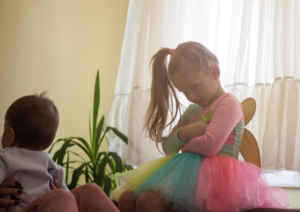- Baby Blues
- Changes in Your Body After Giving Birth
- Grandparents and the New Baby
- Infant Attachment
- Jealousy and Sibling Rivalry: Newborn Edition
- New Dad
- Newborn Routine Practices and Tests
- Preventing Baby Flat Head
- Shaken Baby Syndrome
- Taking Care Of Your Mental Health While Expecting And Caring For A Baby
- Tummy Time
Jealousy and Sibling Rivalry: Newborn Edition
Preparing your young child for the arrival of a new sibling can help create a positive attitude and response.
Bringing Home a New Baby

Welcoming a new baby into your home is an exciting time, but it can also bring a mix of emotions—joy, love, nervousness, and sometimes exhaustion. Older siblings may feel a wide range of emotions, too, including curiosity, confusion, jealousy, or even insecurity. The attention that family and friends used to give them now has to be shared with the new baby, which can make them feel left out.
Your older child may respond in unexpected ways, such as:
- Being extra protective of the baby or seeming uninterested in them.
- Hurting the baby.
- Acting more clingy, becoming upset easily, or appearing withdrawn.
You might also notice behaviours that reflect how they’re feeling, like:
- Thumb-sucking or increased whining.
- Accidents, even if they’re toilet trained.
- Acting like the baby, such as wearing diapers or being fed like the baby.
How You Can Help
Your child might feel like they’re losing attention or being replaced by the new baby. These ideas might help ease the transition:
- Stick to Routines: Keeping your older child’s daily schedule as normal as possible can provide a sense of stability during this time of change.
- Spend One-on-One Time Together: Setting aside moments to focus just on them—like reading a book, going for a walk, or playing a game—can reassure them that they’re still a priority.
- Be Patient: If they regress or act out, it may be a sign of anxiety or stress. Offering comfort and support can go a long way in helping them feel secure.
- Acknowledge Their Feelings: If they express negative emotions about the baby, try to validate their feelings. For example, you might say, “It’s okay to feel this way—it can be hard having a new baby in the house.” Avoid phrases like, “You’re older, so you should know better,” which might add to their stress.
Involve Them in Baby Care
Inviting your older child to participate in caring for the baby can help them feel included and valued. You could:
- Teach gentle touches: Show them how to rub the baby’s back softly and explain how it soothes the baby. Acknowledge their efforts with praise.
- Encourage small tasks: Invite them to help by bringing a diaper, picking out baby clothes, or choosing a toy for the baby. Celebrate their involvement but let them decide how much they want to help without pressure or criticism.
Take Care of Yourself
Adjusting to a new family dynamic can be challenging for parents too. Taking care of your own well-being can help you stay patient and balanced:
- Rest whenever possible.
- Make time for activities that help you recharge, like a walk, a relaxing bath, or connecting with friends.
- Don’t hesitate to ask for support from your partner, family, or friends if you’re feeling overwhelmed.
This Phase Will Pass
With time, patience, and support, your older child will adapt to the changes and find their place in the family.
Books to Share With Your Child
Reading together can help your older child understand their new role as a sibling. Consider these books, which explore themes like love, jealousy, and family changes. Visit the Newfoundland and Labrador Public Libraries catalogue to search for books.
Examples (click to expand) »
- “The New Baby” by Mercer Mayer: This classic Little Critter book follows Little Critter as he adjusts to the arrival of a new sibling. It addresses children’s common concerns and feelings when a new baby comes home.
- “I’m a Big Brother” / “I’m a Big Sister” by Joanna Cole: These board books are designed specifically for young children about to become older siblings. They provide simple, reassuring messages and colourful illustrations to help children understand their new role.
- “Hello Baby!” by Mem Fox: In this sweet book, a young girl eagerly waits for the arrival of her new sibling. The story celebrates the excitement and joy of welcoming a new baby into the family.
- “The Berenstain Bears’ New Baby” by Stan and Jan Berenstain: In this classic Berenstain Bears story, Brother and Sister Bear learn what it means to have a new baby sister. The book addresses common sibling issues and emphasizes the importance of love and family.
- “A Baby Sister for Frances” by Russell Hoban: This charming book follows Frances the Badger as she adjusts to the arrival of a new baby sister. It explores themes of jealousy, sibling rivalry, love and acceptance.
- “You Were the First” by Patricia MacLachlan: This heartwarming book celebrates the bond between a child and their parents, reassuring older siblings that they will always hold a special place in their parents’ hearts, even after the arrival of a new baby.
- “My New Baby” by Rachel Fuller: This interactive board book features simple text and colourful illustrations to help young children understand what it’s like to have a new baby in the family. It includes flaps to lift and explore, making it engaging for little ones.
These stories offer reassurance and can spark meaningful conversations about how they’re feeling. Reading together can also be a comforting way to bond during this big change.
Services related to this information:
- Contact your Public Health Nurse.
- 811 HealthLine (Newfoundland & Labrador) – Call 811 or 1-888-709-2929 / TTY 1-888-709-3555
